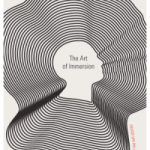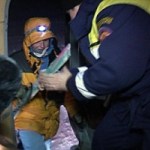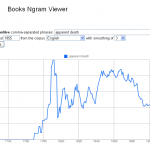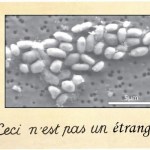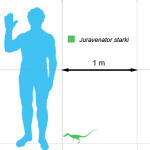
What better way for a bunch of science geeks to celebrate a birthday than by having a science party? We spent a lot of time making delicious science-themed snacks, and I have to say, they came out pretty good!
Bacterial jello plates. They looked a bit too relastic, the cell biologists wouldn't touch them.
More plates, this time made with rice pudding. Tastier than jello, but less popular due to looks.
DIY electrophoresis jello. The red dye didn't migrate, but the yellow colouring of the jello did!
Obligatory placebo gag.
The text reads sample:alcohol 1:2. It didn't lie.
Señor…
Thanks to W. W. Norton & Co. for passing me a copy of The Art of Immersion, by Wired's Frank Rose. The book deals with one of my favourite subjects: storytelling, and how technology is shaping the way we tell stories. After four pages I had to put it down and fetch a pen and paper to keep track of all the ideas it was conjouring in my mind. And that was just the preface! So I thought it would be fair to write a quick review.
The brilliance of The Art of Immersion, to me as a story-teller, is that Rose only hints at the application of the technologies he discusses. With a few well-…
Mika Tan is a 30-something biochemistry graduate working in the United States. She also happens to be a successful porn actress. Tan helped me out when I was looking for a security expert to provide some context on an article about hacking luxury cars; since then I've been following her on Twitter, because, hey, nothing livens up a Twitter stream like a little gangbang gossip in the mornings.
One of the recurring themes on Tan's list of bugbears is her ongoing strife with Facebook, which repeatedly suspends her account for breaching rules on graphic content. This opens up an important…
What games would a robot play? It's a question that struck me last night, and kept me up as I sketched out diagrams for android puzzle toys.
For a start, we have to imagine why a robot would play games. We're not even able to explain why we enjoy them so much. To say that games trigger the reward system in the brain doesn't add anything by way of an explanation. Enjoyment, pleasure, is an atomic building block of behaviour, it's impossible to break it down any further. So why ask why robots would play games when we can't explain our own fascination with them? They just do. We can give…
In the course of making my Radio 4 doc on mind controlling parasites, I visited Professor Jaroslav Flegr at his lab in Prague. Flegr came to prominence after demonstrating that drivers involved in car accidents were far more likely than the general population to be infected with toxoplasma gondii, a parasite known to interfere with risk perception and reflexes in rats.
In a small attic office, we chatted about the university and its funding compared to the larger, better-funded parasitology labs in the UK and beyond. Over endless cups of black tea, Flegr told us that the relatively meagre…
Did the Government's Chief Scientific Adviser just tell me to be a dick? Last week, ResearchResearch revealed comments made by Sir John Beddington at the Annual Conference of Scientists Working in the Civil Service on 3 February 2011:
"We are grossly intolerant, and properly so, of racism. We are grossly intolerant, and properly so, of people who [are] anti-homosexuality...We are not--and I genuinely think we should think about how we do this--grossly intolerant of pseudo-science, the building up of what purports to be science by the cherry-picking of the facts and the failure to use…
Very pleased to discover that after much uncertainty, the Royal Society Science Prize for Books has returned after securing a sponsor. They're currently seeking submissions for this year's award:
Entries for the 2011 Royal Society Winton Prize for Science Books, the world's leading science books prize, are being accepted from today 16 February 2011. The 2011 Royal Society Winton Prize for Science Books will celebrate the best of 2010's new popular science writing for a general adult readership. The Prize is open to science books written for a non-specialist audience. The winner will receive…
How do bees chat to one another? By shaking their funky butts, of course! This video was made by Andy Quitmeyer, a digital media Master's student, for Georgia Tech's MARS lab, in a project funded by the US National Science Foundation.
Bees were one of my favourite subjects when I was studying for my biology degree, who couldn't fall in love with these adorable little chaps*?
*actually, all the bees you see here are female. The males don't work, they just gorge themselves on honey, mate, and die. If you think that sounds fun, bear in mind that they die because the penis is torn off during…
This is aimed as a companion piece to my article published in the Times Eureka magazine on the mathematics of matchmaking. There isn't room in a serious newspaper for flights of sci-fi fantasy, but the technology I saw while researching that article left my head reeling with the possibilities that lay ahead.
To recap: most matchmaking engines online work on a system of collaborative filtering. By studying how you behave, they create a personality profile and compare this to other users on the site. When they find someone who acts in a similar way to you, they use this person's activity to…
Two post-graduate students from Moscow State University were rescued on Tuesday after the ice floe they were sampling broke off and drifted out to sea. The pair had been measuring the thickness of the sheet ice covering the White Sea when the incident occurred.
The unnamed student is rescued from the ice floe
Part of a team of twelve students and two teachers from the Faculty of Geography on a short expedition to Pertominsk, a remote area in the far northwestern edge of Russia. The man and woman were separated from the rest of the group around 4pm, when strong winds caused a 12 by 16m…
I'm sure Google Ngrams needs no introduction, but in case I'm wrong: it's a nifty (if crude and much-misused) tool for investigating the frequency of written terms in Google's vast databank of digitised books - some trillion or so words.
As I was editing my forthcoming zombies book, I fiddled about with Google NGrams to visualise the emergence of certain technologies (such as the sharp rise and fall of galvanism).
One of the central questions in my book is the notion of death, and how it is better understood as a process than a state - i.e. whether you are 'dead' or not depends largely on…
More in-depth analysis available from Ed Yong, Tom Chivers, New Scientist.
Live out your superhero fantasies with this grappling hook gun from Battelle. It shoots 100 feet up and 60 feet across, easily enough to scale ten storeys to your enemy's hideout. They say:
The Tactical Air Initiated Launch (TAIL) system is used to propel a titanium grappling hook towing a Kevlar line for use in Visit Board Search and Seizure (VBSS) operations. It also can be used for fire rescue operations, life vest deployment, or other activities.Besides enhanced performance at reduced cost, the TAIL system's simple, rugged design boosts safety and reliability with the advantage of low…
Hurrah, I'm in New Scientist, writing about some very clever bacteria:
The appeal of sudoku has spread to the prokaryotic world. A strain of Escherichia coli bacteria can now solve the logic puzzles - with some help from a group of students at the University of Tokyo, Japan."Because sudoku has simple rules, we felt that maybe bacteria could solve it for us, as long as we designed a circuit for them to follow," says team leader Ryo Taniuchi.
Read the full text at New Scientist
This time last year I sat in a small room at the Law Society surrounded by far more luminary individuals such as Simon Singh and Dara à Briain for the launch of the report Free Speech is Not for Sale, which highlighted the oppressive nature of English libel law. In short, the law is extremely hostile to writers, while being unreasonably friendly towards powerful corporations and individuals who want to silence critics. The guests heard from scientists, comedians, and journalists who had been gagged by these laws.
The English libel law is particular dangerous for bloggers, who are generally…
Wikipedia user Colin Douglas Howell has created this spiffy gallery of dinosaur size comparison charts, which is ideal for those planning their next off road velociraptor safari.
Many images feature an intrepid time-travelling tourist, who shows the same nonchalance whether facing a cutesy Juravenator starki:
...or imminent death at the hands of some kind of giant reptile brotherhood of villainy:
Jalopnik has some wonderful pictures of relics from the Soviet Lunar Lander program, abandoned after the success of Apollo 11.
Good news for science-loving fans of philately: Royal Mail have released a set of stamps to celebrate British medical breakthroughs throughout the ages.
The launch marks some of the most important medical discoveries that have taken place in the UK since the late 19th Century and include the pioneering work of Sir Ronald Ross in 1897 which was pivotal in the development of today's anti-malarial drugs. Other stamps recognise heart-regulating beta-blockers, the antibiotic properties of penicillin and the computed tomography (CT) scanner.
You can get your hands on the set at your local Post…
